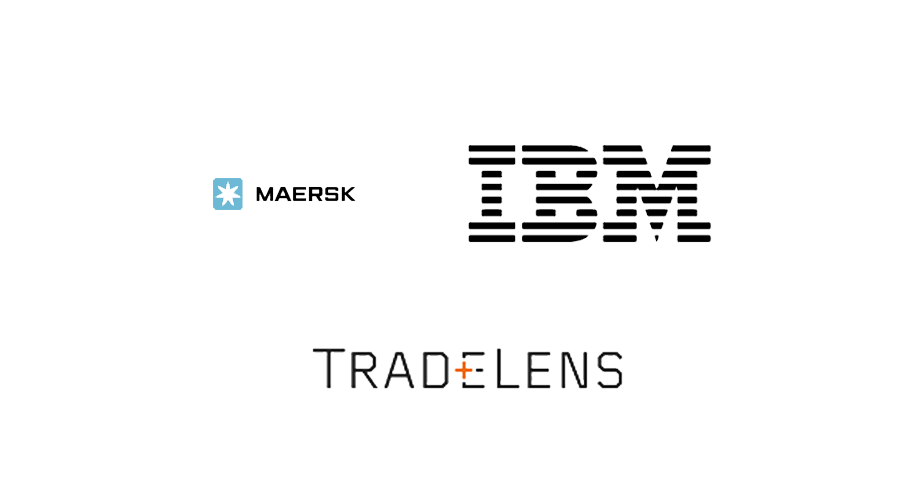In a follow up to their January announcement, A.P. Moller – Maersk and IBM today announced the creation of TradeLens, jointly developed by the two companies to apply blockchain to the world’s global supply chain.
TradeLens is a blockchain-enabled shipping solution designed to promote more efficient and secure global trade, bringing together various parties to support information sharing and transparency, while spurring industry-wide innovation.
As part of the TradeLens early adopter program, IBM and Maersk also announced that 94 organizations are actively involved or have agreed to participate on the TradeLens platform built on open standards.
The TradeLens ecosystem currently includes:
More than 20 port and terminal operators across the globe, including PSA Singapore, International Container Terminal Services Inc, Patrick Terminals, Modern Terminals in Hong Kong, Port of Halifax, Port of Rotterdam, Port of Bilbao, PortConnect, PortBase, and terminal operators Holt Logistics at the Port of Philadelphia, join the global APM Terminals’ network in piloting the solution.
This accounts for approximately 234 marine gateways worldwide that have or will be actively participating on TradeLens.
Pacific International Lines (PIL) have joined Maersk Line and Hamburg Süd as global container carriers participating in the solution. Customs authorities in the Netherlands, Saudi Arabia, Singapore, Australia, and Peru are participating, along with customs brokers Ransa and Güler & Dinamik.
Participation among beneficial cargo owners (BCOs) has grown to include Torre Blanca / Camposol and Umit Bisiklet. Freight forwarders, transportation and logistics companies including Agility, CEVA Logistics, DAMCO, Kotahi, PLH Trucking Company, Ancotrans and WorldWide Alliance are also currently participating.
Deploying Blockchain
TradeLens uses IBM Blockchain technology as the foundation for digital supply chains, empowering multiple trading partners to collaborate by establishing a single shared view of a transaction without compromising details, privacy or confidentiality. Shippers, shipping lines, freight forwarders, port and terminal operators, inland transportation and customs authorities can interact more efficiently through real-time access to shipping data and shipping documents, including IoT and sensor data ranging from temperature control to container weight.
Using blockchain smart contracts, TradeLens enables digital collaboration across the multiple parties involved in international trade. The trade document module, released under a beta program and called ClearWay, enables importers/exporters, customs brokers, trusted third parties such as Customs, other government agencies, and NGOs to collaborate in cross-organizational business processes and information exchanges, all backed by a secure, non-repudiable audit trail.
During the 12-month trial, Maersk and IBM worked with dozens of ecosystem partners to identify opportunities to prevent delays caused by documentation errors, information delays, and other impediments. One example demonstrated how TradeLens can reduce the transit time of a shipment of packaging materials to a production line in the United States by 40 percent, avoiding thousands of dollars in cost. Through better visibility and more efficient means of communicating, some supply chain participants estimate they could reduce the steps taken to answer basic operational questions such as “where is my container” from 10 steps and five people to, with TradeLens, one step and one person.
More than 154 million shipping events have been captured on the platform, including data such as arrival times of vessels and container “gate-in”, and documents such as customs releases, commercial invoices and bills of lading. This data is growing at a rate of close to one million events per day. Traditionally, some of this data can be shared through the EDI systems commonly used in the supply chain industry but these systems are inflexible, complex, and can’t share data in real-time. Too often, companies must still share documents via email attachment, fax, and courier.
TradeLens can track critical data about every shipment in a supply chain and offers an immutable record among all parties involved.
“TradeLens uses blockchain technology to create an industry standard for the secure digitization and transmission of supply chain documents around the world. This initiative will generate tremendous savings for our industry over time while enhancing global supply chain security. Modern Terminals is pleased to participate as a Network Member in testing this exciting shipping industry innovation.”
“As a global logistics provider, CEVA sees a unique opportunity in TradeLens, joining forces with IBM, Maersk and other actors from our industry to promote global standards around an open and neutral solution, delivering on the promise of blockchain. It is an important step in our relentless journey to deliver increased value to all our customers and making business flow.”
“We believe blockchain can play an important role in digitizing global shipping, an area of the global economy that moves four trillion dollars of goods every year. However, success with the technology rests on a single factor –bringing the entire ecosystem together around a common approach that benefits all participants equally. Our work with Maersk and other enterprises in the shipping ecosystem has shown that blockchain can be used to form a strong, connected network in which all members gain by sharing important data and that together we can transform a vital part of how global trade is conducted.”
Joint Collaboration Model To Maximize Industry Adoption
Since announcing the jointly developed solution to digitize global trade in January 2018, and based on feedback from various members of the global supply chain ecosystem who would like to adopt the technology, IBM and Maersk have modified the go to market model and will now deliver their solution through an extension of their pre-existing collaboration agreement instead of a joint venture.
“Our joint collaboration model allows us to better address key feedback from ecosystem participants while ensuring TradeLens interoperability and data protection among Maersk, IBM and all ecosystem participants. We strongly believe this will maximize industry adoption.”
Standards discussions are actively underway with openshipping.org and work to align the TradeLens APIs with UN/CEFACT standards is in progress. The TradeLens APIs are open and available for developer access and feedback from participants in the platform.
The TradeLens solution is available today through the Early Adopter Program. TradeLens is expected to be fully commercially available by the end of this year.
